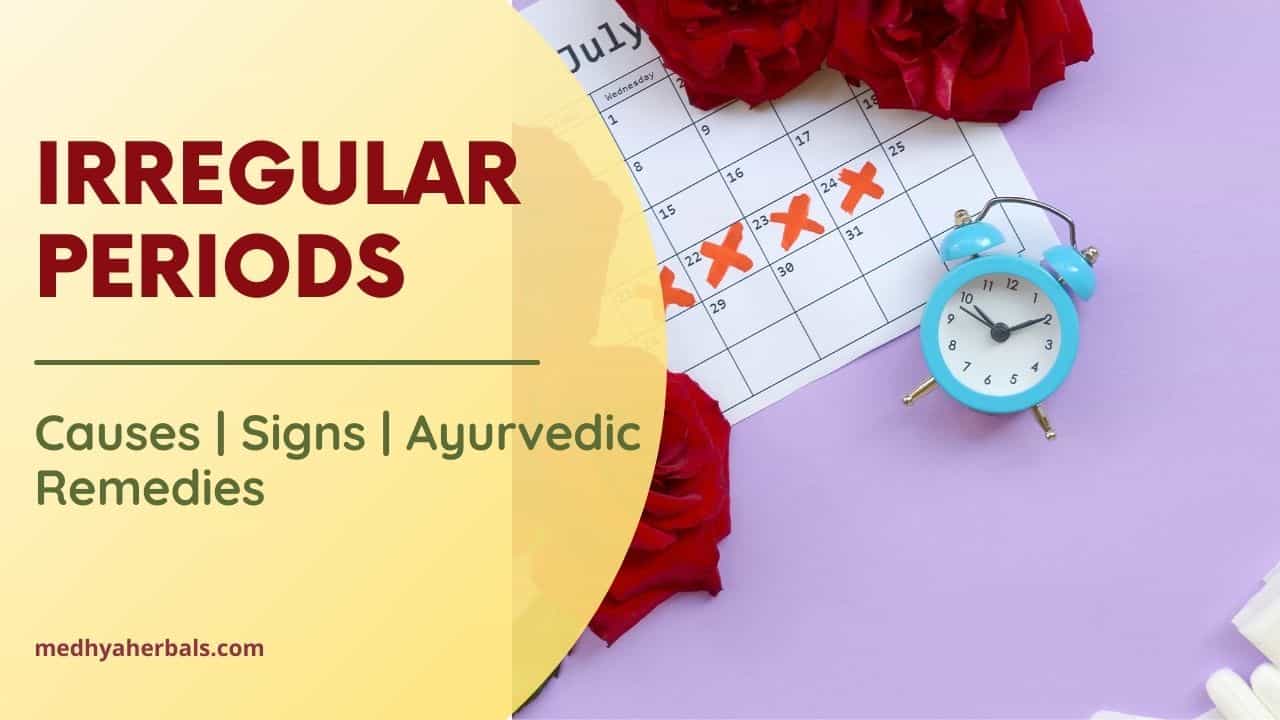A harmonious and regular menstrual cycle is not merely a monthly occurrence; it’s an intricate symphony that plays a vital role in a woman’s health and overall well-being. Regular periods are not just about convenience; they are a marker of vitality, providing valuable insights into a woman’s reproductive health and her body’s equilibrium.
However, in today’s fast-paced world, irregular periods have become a prevalent concern. It’s a topic that touches the lives of countless women, often causing confusion, discomfort, and even alarm. Irregular periods can disrupt daily routines, hint at underlying health issues, and occasionally raise questions about fertility.
In this comprehensive guide, we delve into the significance of maintaining regular menstrual cycles for women’s health and explore the wide-reaching impacts of irregular periods. We’ll uncover the underlying causes, discuss potential side effects, and provide solutions, including Ayurvedic treatments for irregular periods, natural remedies, and lifestyle adjustments. By the end of this journey, you’ll not only understand the complexities of your body but also be equipped with the knowledge to navigate the sometimes turbulent waters of irregular periods with confidence and grace. Let’s embark on this enlightening exploration together.

Understanding Irregular Menstruation
Irregular periods, medically referred to as oligomenorrhea or anovulation, represent a departure from the typical menstrual cycle pattern. Unlike the conventional 28-day cycle, irregular periods encompass a spectrum of variations in cycle length, menstrual flow, and overall regularity. To put it simply, irregular periods are a deviation from the norm in a woman’s menstrual cycle.
Irregular Periods Symptoms
Irregular periods often present with a range of symptoms that can vary from woman to woman. These common symptoms may include:
- Menstrual Pain (Dysmenorrhea): Increased discomfort or pain during menstruation is a prevalent symptom of irregular periods. Some women may experience more intense cramping or abdominal pain than during regular cycles.
- Unpredictable Bleeding: Irregular periods can bring about unexpected spotting or bleeding between regular menstrual cycles. This erratic bleeding can be disruptive and concerning.
- Missed Periods (Amenorrhea): Irregular periods may manifest as missed periods or infrequent menstruation. Women with irregular cycles might skip menstrual cycles entirely or have periods at irregular intervals.
- Inconsistent Flow: The flow of menstrual blood can fluctuate significantly during irregular periods. Some women may experience unusually light periods, while others may have exceptionally heavy menstrual flow during irregular cycles.
- Extended Menstruation (Menorrhagia): Irregular periods can sometimes result in prolonged menstruation, where bleeding continues for an extended period beyond the typical duration of a menstrual cycle.
- Cycle Length Variations: Women with irregular periods may encounter cycles that are shorter or longer than the average 28 days. These variations can make it challenging to predict the onset of menstruation.
- Emotional Distress: Dealing with irregular periods can lead to emotional distress, including anxiety and frustration, as women may find it difficult to anticipate or manage their menstrual cycles effectively.
- Impact on Daily Life: The unpredictability of irregular periods can disrupt daily routines, affect work or social activities, and create additional stress and inconvenience.
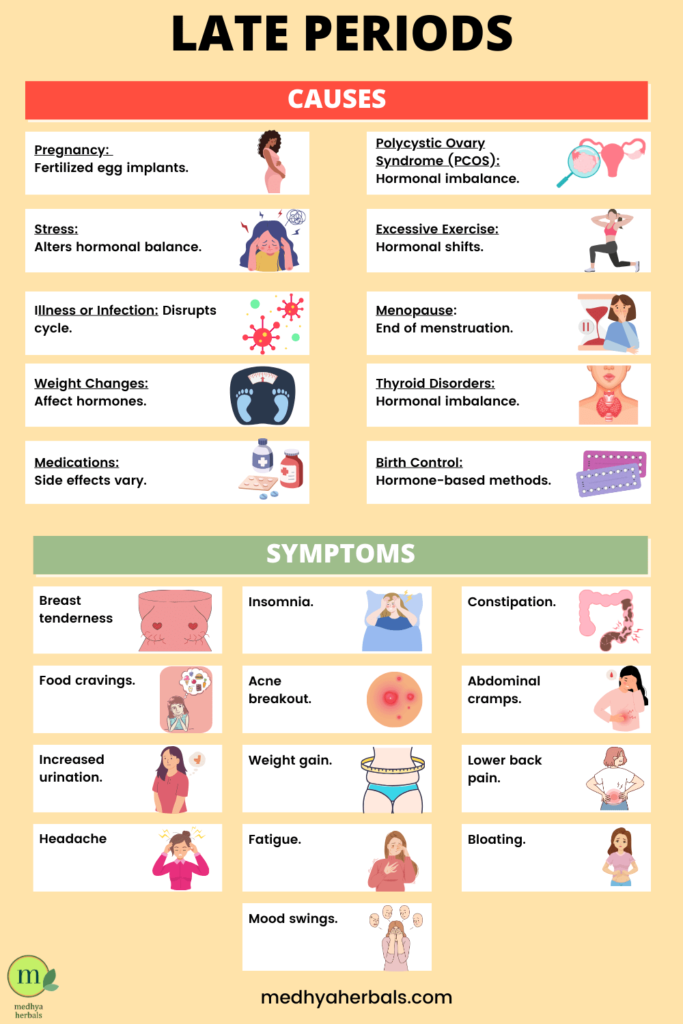
7 Signs of Irregular menstrual cycle That You Should Know
Just as a normal menstrual cycle is in a wide range, so also is an abnormal period. Here are the 7 most commonly signs of irregular menstruation.
1. Amenorrhea (No Periods) | Absence of Menstrual Flow
This is a condition in which there is outright absence of menstruation, even through the woman is in her reproductive years. Loss of menstrual flow either due to a health condition or temporary hormonal imbalance can lead to Amenorrhea.
2. Oligomenorrhea (Delayed or Missed Periods) | Extremely Long Menstrual Cycle
This a when the menstrual cycle is longer that normal. That is, the cycle lasts for more than 35 days.
So, if your menstrual cycle is coming after every 40 days or 60 days and it still comes then you need to get checked for hormonal imbalances.
3. Polymenorrhea (Frequent Periods) | Extremely Short Menstrual Cycle
Polymenorrhoea is an opposite menstrual disorder as compared to oligomenorrhoea. In polymenorrhoea, the menstrual cycle is shorter than 21 days.
In other words, there is menstruation more than once within 21 days or three weeks. This is shorter than the normal range. This is usually the case with Endometriosis and Thyroid disorders.
4. Hypomenorrhea (Scanty Periods) | Light Menstrual Flow
This one involves the period, and not the whole cycle. It is characterized by period that lasts for less than 2 days with little blood. The menstrual blood flow is so light that during the period, there’s only a need for 1 pad/day or even less.
This is usually the case with low estrogen levels due to nutrient deficiencies or excessive stress.
5. Menorrhagia (Heavy Periods) | Heavy Menstrual Flow
Menorrhagia is quite the opposite to hypomenorrhoea. It is characterized by flow lasting for longer than 8 days. The flow is so heavy that it requires 5 pads/day, or more.
There might also be blood clots that come out with the heavy flow of blood.
This happens due to high estrogen that builds up excessive endometrial lining.
6. Dysmenorrhea | Excessive Period Cramps
While there can usually be some degree of pain and cramping during menstruation, but with dysmenorrhea is diagnosed when your menstrual cramp affect your ability to function.
Usually this is the case in endometriosis and extreme hormone imbalances as PCOS.
There is spasmodic pain in the first two days, which can be felt in the lower abdomen and is radiating to the legs.
7. Brown Spotty Stains
Dark brownish and rusty menstrual flow in the form of spotting and stains is usually caused by low Progesterone levels. In this case the endometrial lining hasn’t built up fully and also the old blood from previous cycle hasn’t cleared up.
This menstrual blood gets oxidized in time causing brownish colored flow, which is scanty due to insufficient built up.
Now that you have understood the causes and symptoms of irregular menstrual cycle, let’s take a look into the Ayurvedic treatment for regular period.
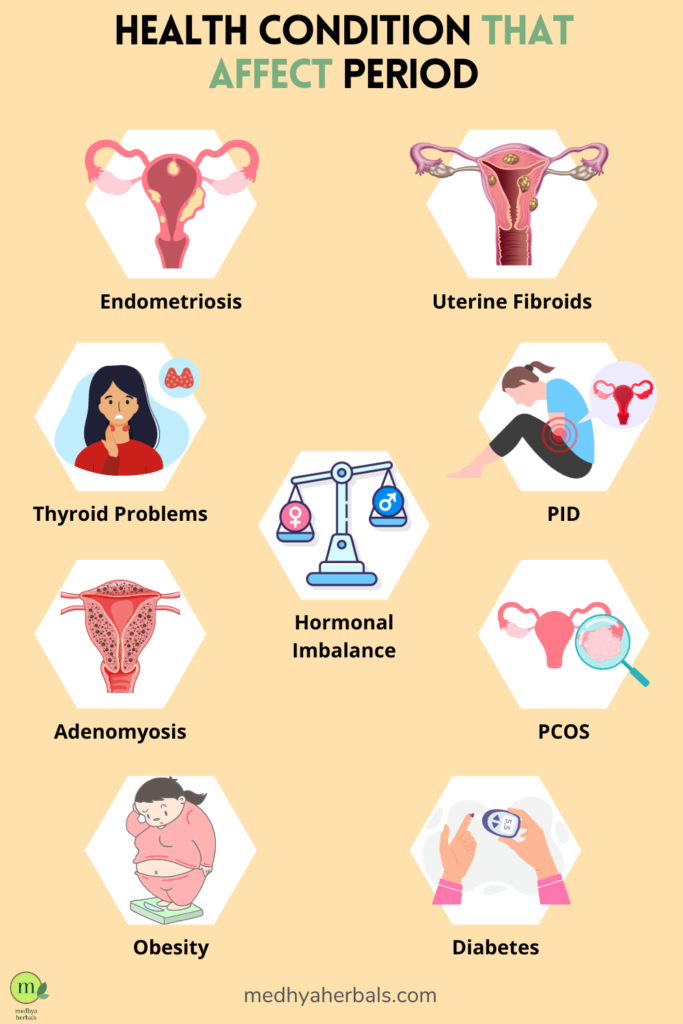
What Causes Irregular Menstruation?
An irregular period is usually a common occurrence for young girls after they attain menarche and for women who are close to menopause. This is because the sex hormones (Estrogen and Progesterone) that regulate the menstrual cycle are not flowing in a regular way at both ends of the reproductive life.
However, when your periods do not follow a clockwork during your reproductive years (from late teens to early 40s) then it surely is an indication of hormonal imbalances that have put your menstrual cycle out of sync. Here are some of the factors that trigger hormonal imbalance, which eventually causes menstrual irregularity.
Hormonal Imbalances
- Imbalanced Hormones: Irregular periods frequently result from hormonal fluctuations. The menstrual cycle’s intricate dance is regulated by hormones like estrogen and progesterone. Any disturbance in the delicate hormonal balance can disrupt the menstrual rhythm.
- Polycystic Ovary Syndrome (PCOS): PCOS is a common hormonal disorder affecting women of reproductive age. It often leads to irregular periods due to the presence of small cysts on the ovaries, which can interfere with normal hormone production.
Lifestyle Factors
- Diet and Nutrition: Poor dietary choices and inadequate nutrition can impact hormonal balance, contributing to irregular periods. Highly processed foods, excessive sugar consumption, and extreme dieting can disrupt the hormonal equilibrium necessary for regular menstruation.
- Exercise Habits: Intense physical activity, especially when coupled with low body fat levels, can lead to irregular periods. Athletes and individuals engaged in rigorous training may experience menstrual cycle disturbances.
- Weight Fluctuations: Significant changes in body weight, either through weight loss or gain, can contribute to irregular periods. Alterations in body fat percentage can affect hormone levels, leading to cycle irregularities.
Medical Conditions
- Thyroid Disorders: Thyroid hormones play a pivotal role in regulating the menstrual cycle. Conditions like hypothyroidism (underactive thyroid) or hyperthyroidism (overactive thyroid) can disrupt hormonal balance and result in irregular periods.
- Uterine Disorders: Structural issues within the uterus, such as fibroids or polyps, can affect menstrual flow and lead to irregular periods. These growths in the uterine lining can interfere with the normal shedding of the endometrium.
- Endometriosis: Endometriosis is a condition where tissue similar to the uterine lining grows outside the uterus. It can cause not only painful periods but also irregular bleeding patterns.
Emphasizing Stress and Emotional Factors
- Stress and Anxiety: High levels of stress and anxiety can disrupt the hormonal regulation of the menstrual cycle. The body’s stress response can lead to irregular periods or missed periods.
- Emotional Well-being: Emotional stressors, such as depression, anxiety, or emotional trauma, can impact menstrual regularity. Emotional well-being is closely interconnected with hormonal balance, and disturbances in mental health can manifest as irregular periods.
Menstrual Cycle | An Ayurvedic View
In Ayurveda, menstruation is considered to be a part of monthly cleansing for females. Menstrual blood is the waste product formed when blood tissues or Rakta Dhatu is generated from the Rasa Dhatu or Plasma Tissues. Menstrual cycle allows monthly flushing of the unwanted materials and malignant tissues. That’s why menstruation in Ayurveda is considered to be the time to rejuvenate, relax, and nurture the body and mind.
Ayurvedic View of Menstrual Irregularity
Regular menstrual cycle is necessary to maintain the balance of Dosha, hormones, and for proper functioning of reproductive system for women. A healthy monthly cycle is also an indicator of vitality and fertility in a woman. Healthy natural periods enable women to better work with fertile windows and experience healthy pregnancy outcomes.
On the other hand, painful and irregular menstruation is a sign of dosha imbalance in Ayurveda. The dynamic forces of growth (Kapha dosha ), transformation (Pitta dosha), and movement (Vata dosha) guide the three stages of Menstrual cycle.
Effect of Dosha on Monthly Cycle
1. Kapha dosha imbalance can lead to delayed period, heavy menstrual bleeding with clots, or alternating heavy period and scanty period.
2. Pitta dosha imbalance can lead to menstrual disorder related to an excessive growth of the endometrium layer (endometrial hyperplasia), heavy bleeding, spotting in between periods and dysfunctional uterine bleeding.
3. Vata dosha imbalance leads to missed periods, delayed menstruation, painful menstrual cramps, bloating, and PMS symptoms.
Irregular Periods Treatment in Ayurveda
The goal of Ayurvedic treatment for irregular menses is to restore the hormonal balance and fertility.
Irregular periods treatment in Ayurveda involves Ayurvedic medicines, herbal remedies, diet, yoga and lifestyle changes. This holistic approach helps to detox, ignite digestive fire for balanced nutrition, regulate menstrual cycle for regular ovulation and fertility, and reduce stress for mental wellness and hormonal balance.
Here are the steps involved in Ayurvedic treatment for irregular menses:
- Detoxification to get rid of toxins and inflammation in the body.
- Ignite digestive fire to promote digestion and nutritional sufficiency.
- Hormone Balance to support regular ovulation & boost fertility.
- Promote Mental wellness & stress reduction through ayurvedic remedies, yoga, pranayama & meditation.
- Rejuvenation with rasayana to boost immunity & raise energy level.
- Balanced Nutrition with individual specific diet to nurture body tissues.
1. Herbal Medicine for Irregular Periods Treatment in Ayurveda
Ayurvedic remedies and herbal medicines are highly effective to treat period problem at root cause level.
Ayurvedic herbs work by balancing hormones, strengthening the reproductive system, and promoting mental wellness. Here are some of the most popular Ayurvedic medicine for irregular menses:
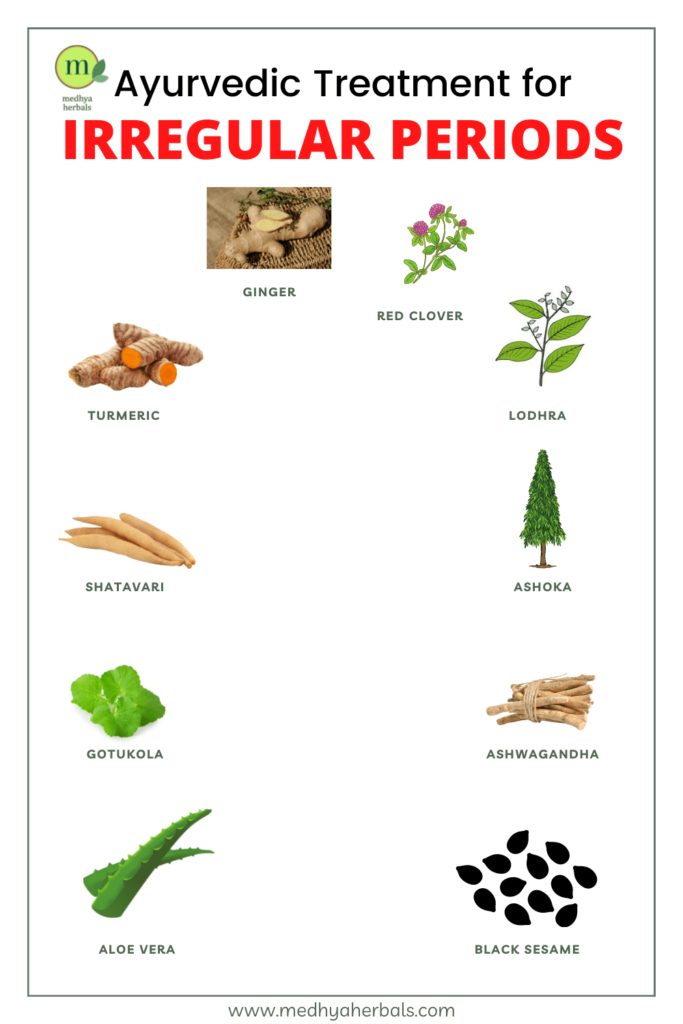
Aloe Vera: This herb has been used to treat menstrual disorder and establish downward flow of apana vata doha. It is useful during all stages of the menstrual cycle.
Ashwagandha: It is an adaptogen that reduces stress and increases our body’s strength. It also used to treat male infertility. Regular consumption of Ashwagandha establishes hormone balance and regulates the menstrual cycle..
Shatavari: A uterine tonic, Shatavari is extremely important Ayurvedic herb for women health. It increases level of Progesterone, flushes excess Estrogen and nourishes the uterus.
Ginger: It is one of the best common herb that acts as a natural pain killer for PMS symptoms. It reduces intensity of menstrual cramp and elevates the level of brain chemicals. Take it as ginger tea.
Turmeric: Reduces inflammation and helps to detox naturally and relieves pain. Turmeric also helps to balance Vata dosha and establishes regular flow during periods. Caution should be taken, if you have heavy bleeding menstrual disorder.
Black Sesame Seeds: Provide nutrients such as Magnesium, Iron and Calcium. Reduces inflammation, establish menstrual flow and regular period.
Lodhra: It reduces heavy menstrual bleeding. The bonus point here is that it reduces abdominal discomfort before and during menses.
Ashoka: It is the reliever of grief and can help offset depression and mood swings. Furthermore, it directs apana vata downward. What’s more, it is a general detoxifying agent.
Gotukola: This improves cognition but also helps in providing better energy to the mind.
2. Ayurvedic Diet for Regular Period and Healthy Menstrual Cycle
Let food be your medicine and medicine be your food! This is a popular saying and one of the basic pillars of Ayurveda. A healthy and balanced diet nourishes your body and supports the vital energy of life.
Additionally, make herbs and spices an integral part of your Ayurvedic Diet. They promote digestion, provide one with essential nutrients and antioxidants, and relax your senses.
- Consume warm, unctuous, easily digestible, and lightly spiced foods.
- A light diet that consists of easily digestible vegetables, grain forms, and fruits should be consumed.
- Spice up your meals with digestion promoting spices and herbs such as cinnamon, black pepper, mint, carom seeds, ginger, and cardamom.
- Do not overeat. Consume food in small portions such that they are easy to digest and do not overload the digestive system.
- Use healthy fats such as ghee, mustard oil, sesame oil, and coconut oil to prepare your meals.
- Stop or reduce caffeine, alcohol and smoking. All of these are stimulants that reduce sleep and further aggravate hormonal imbalance.
- Reduce your salt and sugar intake. For sugar, replace it with natural sweeteners such as molasses, jaggery, and honey.
- Hydrate the body well with herbal teas. Use herbs such as Cardamom, Ginger, Fennel, Saffron, and Cinnamon. This will nurture your body and mind and also balance the hormones. It will also support digestion and relieve symptoms of bloating and indigestion.
3. Ayurvedic Health Tips for a Regular Menstrual Cycle
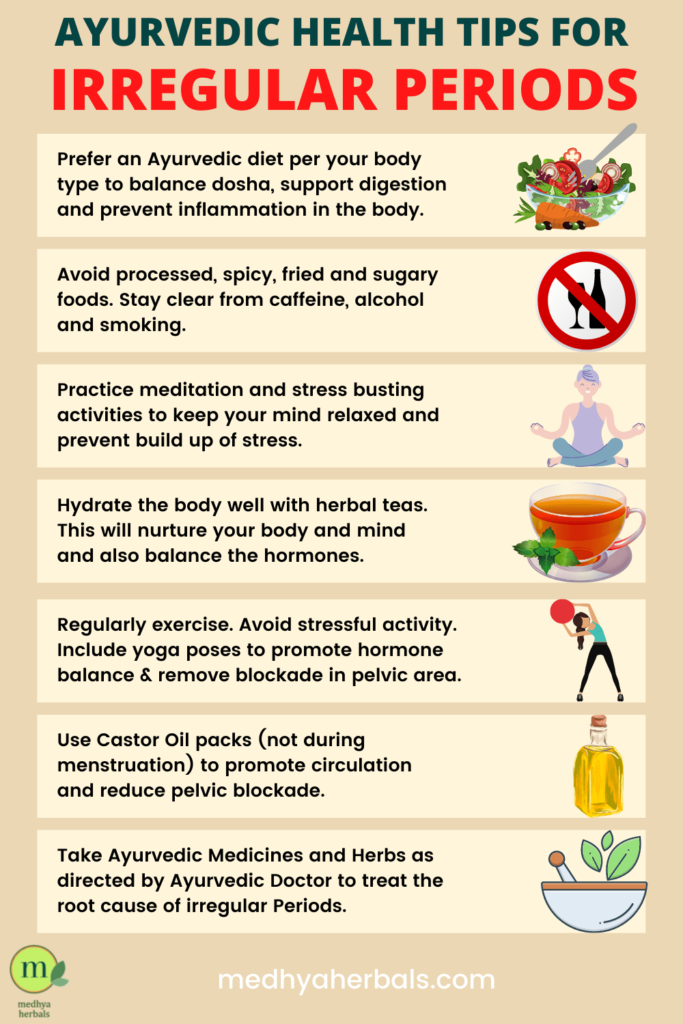
- Eat warm, well-cooked meals, e.g. soup,. Ensure you eat at regular times.
- Use spices generously. Some excellent choices of spices include cinnamon, fennel, ginger, cardamom, turmeric, basil.
- Stay away from cold and raw foods, salads, excessive salt.
- Include healthy oils in your diet, and massage yourself daily with oil.
- Practice yoga, tai chi, and meditation. This reduces stress and balances hormones for regular menstrual cycle.
- Eat foods rich in Progesterone. Some examples are egg yolks, seeds, sea weed, spirulina, and banana flower. This will support regular ovulation, fertility and regular period too.
- Increase your intake of B Vitamins such as Folic Acid, B12, and Healthy fatty acids.
Conclusion
In the journey of a woman’s life, irregular periods can be a perplexing and sometimes frustrating companion. We understand the challenges you may face in dealing with this condition, from the uncertainty of predicting your cycle to the discomfort that irregularities can bring. However, there’s a beacon of hope on the horizon, and it comes in the form of Ayurvedic root cause treatment.
At Medhya Herbals, our Ayurvedic doctors specialize in providing personalized treatment plans that delve deep into the root causes of irregular periods. We sympathize with the struggles you may have encountered in your quest for relief, but we assure you that Ayurveda offers a holistic approach that can provide lasting relief. Our time-tested, natural treatments aim not only to alleviate symptoms but also to rebalance your body and restore your menstrual harmony.
If you’re ready to bid farewell to irregular periods and embark on a journey toward permanent relief, we invite you to schedule a consultation with our Ayurvedic doctors. Your path to restored well-being begins with understanding your unique body and its needs. Let us guide you on this transformative journey towards regular, pain-free periods and a life of balance and vitality. Don’t hesitate—take the first step today by contacting us at Medhya Herbals, because your health and comfort deserve nothing less.
FAQ
What is the Normal Menstrual Flow like?
Menstrual Bleeding can vary in intensity from woman to woman again. However, ideally, a rate of bleeding that requires you to use 3 pads/day is considered normal, with an allowance of 2 pads/day, plus or minus. Again, that is to say that using between 1-5 pads/day during your period is normal, and you have nothing to worry about if this is the case with you.
What’s the Normal Days of Menstrual Flow? How Long should Menstruation Last?
Don’t confuse the length of the menstrual cycle and that of the menstrual period. The cycle lasts from one period of flow to the other, as defined above. On the other hand, a period is the actual phase of menstrual flow. It is the stage when you experience bleeding. A normal period lasts for an average of 5 days, with an allowance of 3 days, plus or minus. That is to say, the length of a normal period is between 2 – 8 days. Thus, if your period lasts longer than 8 days consistently with heavy bleeding then it’s not normal. Similarly, if your period doesn’t have sufficient flow or lasts for less than 2 days, then also you should see a doctor.
What is a Normal Menstrual Cycle?
It must be stated at this point that, what defines “normal” when speaking of menstrual cycles is actually a wide range. Each woman has her own unique menstrual cycle. The key is to note what is normal for you and watch it. If there is a wide variation in “your own” regular cycle, then that change is not normal. With that said, let’s go on to see what a normal menstrual cycle is.
Can you have irregular periods after 35?
Yes, it’s entirely possible to experience irregular periods after the age of 35. While many women may have had relatively regular menstrual cycles in their younger years, hormonal changes associated with aging can lead to fluctuations in the menstrual cycle. Perimenopause, the transitional phase before menopause, often begins in a woman’s mid-to-late 30s or early 40s, and it is characterized by irregular periods, among other symptoms. These irregularities may include changes in cycle length, flow, and frequency. While irregular periods are common during perimenopause, it’s important to note that they do not necessarily signify a health problem. However, consulting a healthcare provider can help manage any discomfort or concerns associated with these changes.
What causes irregular periods in 30s?
Irregular periods in one’s 30s can be attributed to a variety of factors. Hormonal fluctuations become more common as women age, and these shifts can impact the menstrual cycle. Perimenopause, the transitional phase before menopause, often begins during the late 30s or early 40s, and it brings about significant hormonal changes that lead to irregular periods. Additionally, lifestyle factors, stress, changes in body weight, and underlying medical conditions can contribute to menstrual irregularities during this stage of life. Understanding these potential causes is crucial for effectively managing and addressing irregular periods in one’s 30s.
When Do Periods Change After 30?
As women reach their 30s, it’s common to observe shifts in their menstrual cycles. These changes can vary widely among individuals but often include alterations in cycle regularity, flow intensity, and accompanying symptoms. These shifts are typically influenced by factors such as hormonal fluctuations, lifestyle adjustments, and the natural aging process. Understanding these changes is essential for women to manage their reproductive health effectively as they transition into this phase of life.
Can irregular periods lead to infertility?
Irregular periods can indeed raise concerns about fertility. Irregular menstrual cycles may indicate underlying hormonal imbalances or conditions like polycystic ovary syndrome (PCOS), which can affect ovulation. Since regular ovulation is crucial for conception, irregular periods may make it more challenging to predict fertile windows, potentially delaying pregnancy. However, it’s important to note that irregular periods do not necessarily equate to infertility. Many women with irregular cycles still conceive, but addressing the underlying causes and seeking medical guidance can be essential for those trying to conceive while experiencing irregular menstruation.
What’s the Normal Length of a Menstrual Cycle?
The length of the menstrual cycle is calculated as the first day of the last menstrual period (when you had red colored flow) to the first day of the next period (again red colored flow). You should track yours over three months to learn more about your cycle length and to detect abnormalities if any.
The average length of the menstrual cycle is 28 days, around 4 weeks. Since, every woman has a unique body type, so is the menstrual cycle. For majority of the women who go through healthy natural periods, it can range from anywhere between 21 days (3 weeks) to 35 days (5 weeks).
While one has a variable length of the cycle, it should always fall in the range of 21 days to 35 days for it to be considered healthy. If you have shorter than 21 days or longer than 35 days on a consistent basis, then you should see a Doctor.
References
Normal Menstrual Flow and the Control of Ovulation
Normal Menstrual Flow

